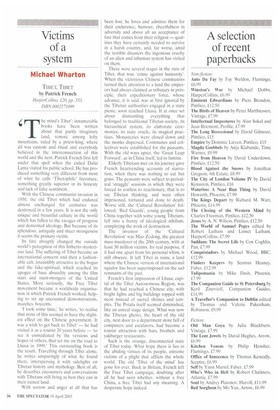Victims of a system
Michael Wharton
TIBET, TIBET by Patrick French HarperCollins, £20, pp. 333. ISBN 0002571099
he mind's Tibet': innumerable books have been written about that partly imaginary land, remote among lofty mountains. ruled by a priest-king, where all was custom and ritual and everybody believed in the interconnection of this world and the next. Patrick French first fell under that spell when the exiled Dalai Lama visited his public school. He has produced something very different from most of what he calls 'Tibetophile' literature, something greatly superior in its honesty and lack of false sentiment.
With the Chinese communist invasion in 1950, the old Tibet which had endured almost unchanged for centuries was destroyed in a few years. It is not the only unique and beautiful culture in the world which has fallen to the ravages of progress and demented ideology. But because of its splendour, antiquity and sheer strangeness it seems the primary victim.
Its fate abruptly changed the outside world's perception of this hitherto mysterious land. The suffering of Tibet became an international concern and then a fashionable cult, irresistibly attractive to the bogus and the fake-spiritual, which reached its apogee of base absurdity among the film stars and stunt-mongers of the United States. More seriously, the Free Tibet movement became a worldwide organisation in which Patrick French worked, helping to set up uncounted demonstrations, marches. boycotts.
'I took some time,' he writes, 'to realise that none of this seemed to have the slightest effect on the Chinese government. It was a wish to get back to Tibet' — he had visited it as a tourist 20 years before — 'to see it unmediated by the versions and hopes of others, that set me on the road to Lhasa in 1999.' This outstanding book is the result. Travelling through Tibet alone, he writes unsparingly of what he found there, interspersing it with sidelights on Tibetan history and mythology. Best of all, he describes encounters and conversations with Tibetans still living as best they can in their ruined land.
With sorrow and anger at all that has been lost, he loves and admires them for their endurance, humour, cheerfulness in adversity and above all an acceptance of fate that comes from their religion — qualities they have certainly needed to survive in a harsh country, and, far worse, amid the terrible disasters the ingenious cruelty of an alien and inhuman system has visited on them.
There were several stages in the ruin of Tibet, that true 'crime against humanity'. When the victorious Chinese communists turned their attention to a land the emperors had always claimed as tributary in principle, their expeditionary force, whose advance, it is said, was at first ignored by the Tibetan authorities engaged in a state picnic, soon reached Lhasa. It at once set about dismantling everything that belonged to traditional Tibetan society, its hierarchical system, its elaborate ceremonies, its state oracle, its magical practices. Monasteries were closed down and the monks dispersed. Communes and collectives were established for the peasants. With the old ways upset. the 'Great Leap Forward', as in China itself, led to famine.
Elderly Tibetans met on his journey gave French heartrending accounts of starvation, when there was nothing to eat but grass. The peasants were subject to periodical 'struggle' sessions in which they were forced to confess to reactionary, that is to say Tibetan thinking, and were often imprisoned, tortured and done to death. Worse still, the 'Cultural Revolution' followed: 'Red Guards', young people from China together with some young Tibetans, fell into a frenzy of ideological nihilism, completing the work of destruction.
The inventor of the 'Cultural Revolution' was Mao Zedong, the greatest mass murderer of the 20th century, with at least 30 million victims. Its real purpose, if it had one apart from his personal whim, is still obscure. It left Tibet in ruins, a land where the Chinese version of international squalor has been superimposed on the sad remnants of the past.
French's first impression of Lhasa, capital of the Tibet Autonomous Region, was that he had reached a Chinese city, with bright lights and big buildings topped with neon instead of sacred shrines and temples. The Potala itself seemed diminished, like an unreal stage design. What was now the Tibetan ghetto, the heart of the old city, next door to a department store full of computers and escalators, had become a tourist attraction with bars, brothels and yakburger restaurants.
Such is the strange, disconnected state of Tibet today. What hope there is lies in the abiding virtues of its people, extreme victims of a plight that afflicts the whole world. The old 'Tibet of the mind' has gone for ever. Back in Britain, French left the Free Tibet campaign, doubting after all he had seen whether, without a free China, a free Tibet had any meaning. A desperate hope indeed.


































































 Previous page
Previous page